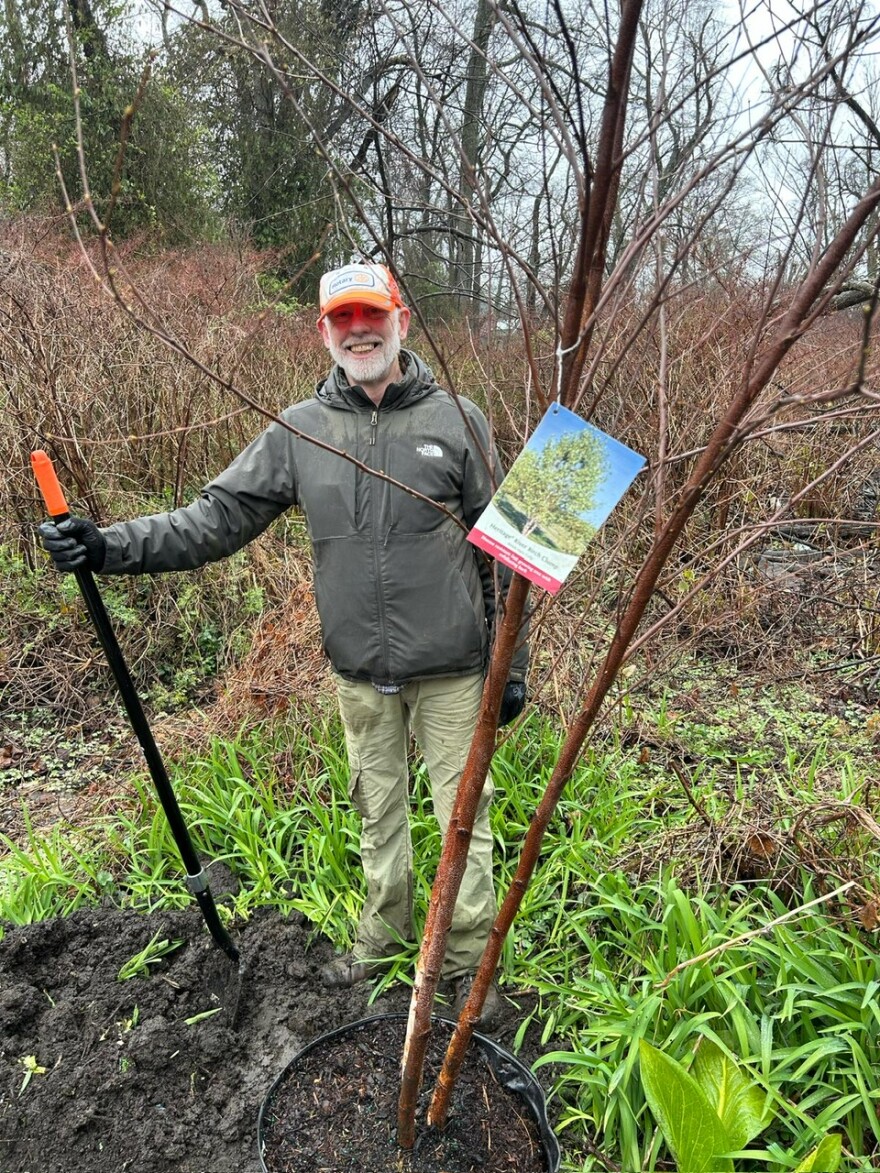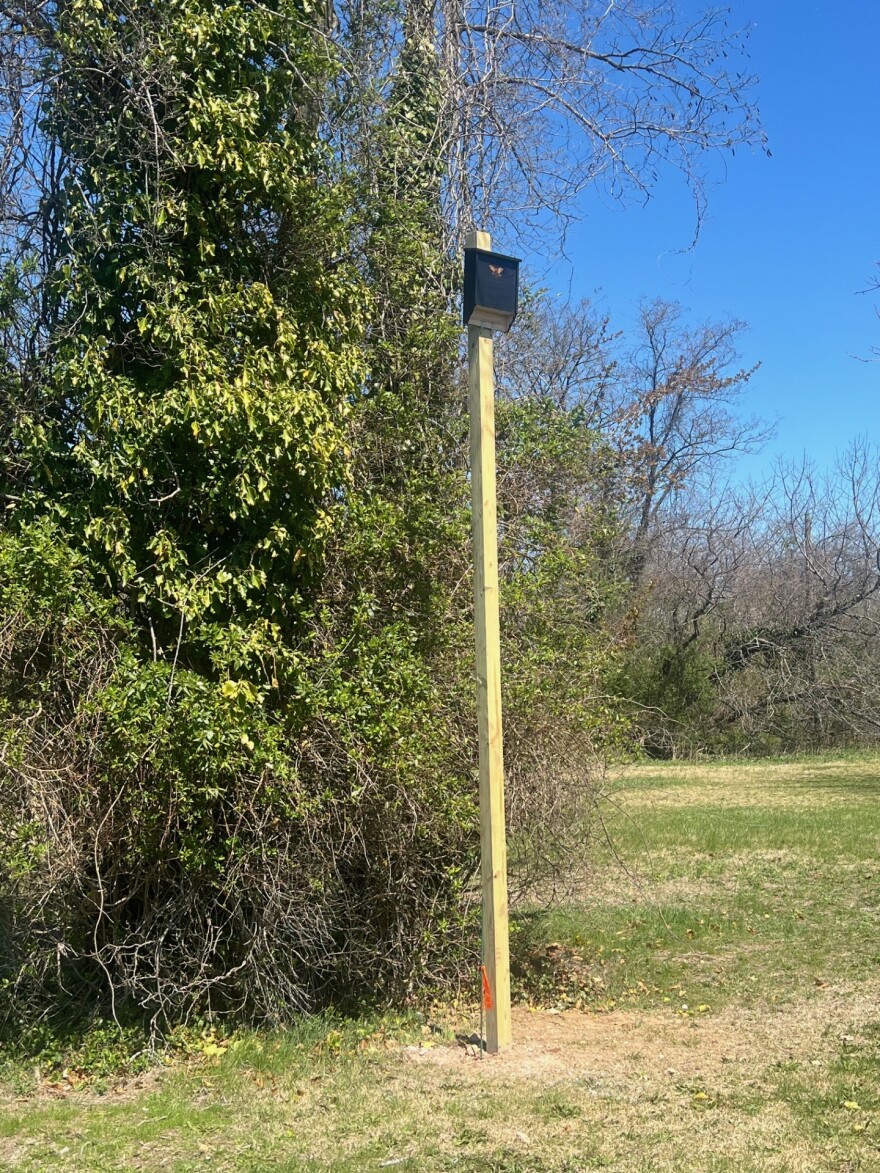Thanks to a group of volunteers, Nassau County’s Brookside Preserve will soon have some new residents. They’re hoping bats will make a home in ten wooden boxes placed around the grounds. WSHU's Sabrina Garone spoke with Chris McBride to learn more. He is the executive of the newly formed Eco Rotary of Nassau County, Long Island.
WSHU: So to start off, if you could just describe where we are right now for those listening — Brookside Preserve in Freeport, South Shore of Nassau County — what does that environment look like there?

CM: There's a small creek called Milburn Creek that runs from around Hempstead Lake to the bay. It used to be called Freeport River a long time ago, and they've built little parks at various points along Milburn Creek. One nestled between Baldwin and Freeport, called Brookside Nature Preserve, is near my home and has become a special place for me. There are high schools and little baseball fields in the community around the area, a lot of manicured yards, and then the somewhat wild nature preserve, which is Nassau County property.
WSHU: And you know, we're looking at a part of Long Island that's pretty built out, right? So, having that natural space is pretty important. Could you talk to that as well?
CM: It's a good point. And having been raised up in the Hudson Valley, where, as a youngster, I played in the woods a lot, I became attached to nature. So when Mrs. McBride and I saw an opportunity to move even closer to the preserve, we did. Now I have joined with other people in the community to try and bring some life and health back to the ecosystem here. It's been fairly encouraging that a lot of people have stepped up to volunteer.
WSHU: Tell me about some of the pest issues that the preserve is dealing with.
CM: The preserve consists of several lots of property. There's a field where, at one time, the Brooklyn Waterworks existed, and it had become a defunct water plant. Then the property became vacant and the old building got decrepit. The property was tied up in various lawsuits. They wanted to build on it, and the community shut that down. It now stands sort of vacant as two large fields near the railroad tracks at the south end of the observe. In between, it's a fairly wooded area with a creek down the middle, and there's not much life in the creek, unfortunately.

WSHU: There's an issue with mosquitoes as well, right? And that's because of that sitting water in the creek?
CM: Yes, partly due to the creek and its evolution with the Department of Public Works cutting logs as trees fall. Somehow, I imagine humans, those logs end up in the creek and have sometimes blocked it, causing the water to overflow the banks, going this way and that. This is not good for the roots of the trees, as well as various points where water runoff from the streets is channeled into the preserve. It's created a swampy loam in a lot of parts, which are prone to mosquito populations.
So, we have formed this group of residents. One of them, Melissa Munfa, suggested the use of bat boxes as a natural way to combat mosquito populations. She had undertaken that type of project before, and so I understood and welcomed this project. Together, we went to the Freeport Merrick Rotary Club and asked for funding. We are also including native plant planting. We approached two major nurseries in the community, Hicks Nursery and Atlantic Nursery. They generously contributed plants, and we got funding from both the Rotary District of Long Island, which is District 7255, as well as the Freeport Merrick Rotary Club. I intend to launch an ecological rotary club on July 1. That'll be focused specifically on the environment and exclusively so that should help enable us to access funding and volunteers to do further work on bringing back the ecology in a sustainable way, hopefully reducing the mosquito population, and increasing the animal populations.
WSHU: And can you just describe to me what the bat boxes are like? What makes a good bat habitat?
CM: I've learned a little bit about bats through this project. They're not territorial animals.
They're community animals that sleep in boxes upside down, or caves, or trees. In our case, we've provided ten homes for them, which I understand will be distributed between bats who need to rest at night and then hopefully other bat boxes will become nurseries for the young bats, where they're fed and cared for by their parents, in a sort of communal way. The difference between them and birds is that they don't lift off with their wings; they drop. As they're falling, they spread their wings and catch the wind, allowing them to take off. So, they need to be a good 15 feet or so off the ground.

They're called little brown bats, and I read that they can eat up to 1000 mosquitoes an hour. Quite amazing little creatures. Many of us remember them when we were young. I've heard many stories of my mother catching one and letting it go, or my father shooting it with a shotgun. People have heard a lot of stories about bats, some true and some not, I guess. But to me, they're just mice with wings!
WSHU: What are the other effects going to be on the preserve, and I guess, the larger environment of Nassau County, once there are fewer mosquitoes? Will that attract other insects that are native to come back to these parts? What are the long-term effects?
CM: By dealing with the mosquitoes in a sustainable, natural way, it will reduce the use of chemical sprays. The chemical sprays to kill mosquitoes kill a lot of other insects as well, not to mention poisoning the insects that are consumed by birds. So, it should have a positive effect on the ecosystem overall by reducing chemicals and filling a void in the ecosystem that has been left by humans.
To me, the emphasis is equally on the planting of native plants, and they need to be cared for and hopefully not abused by people. I hope that we can aggressively deal with the invasive species in many of our parks and even communities. We need more tree education, and a variety of subjects like this can be shared through a community organization like Rotary, which announced a strong commitment to the environment a few years ago and has been following through on that, offering grants to do all sorts of good work on the environment.





